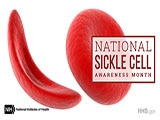Ignored No More: Reimagining Primary Health Care to Combat Sickle Cell Disease in Africa
A genetic mutation that is believed to have occurred 7,300 years ago continues to kill thousands of persons every year in Africa. Researchers studying historical records and analysis of the genomes of close to 3,000 people with some genetic history of Sickle Cell Disease, or SCD, believe that it originated over 250 generations ago in the Green Sahara, somewhere in West-Central Africa.
Sickle Cell Disease is a group of inherited red blood cell disorders, caused by a single gene mutation, resulting in red blood cells that become hard and sticky and look like a “sickle”. The sickle cells die early, which causes a constant shortage of red blood cells, or anemia. The sickle cells get stuck in small blood vessels and impede blood flow, causing severe pain, chronic inflammation, and organ damage. Nearly every organ in the body can be adversely affected by SCD, which ultimately results in multiple organ failure and premature death, occurring mostly in children under five years, adolescents and pregnant women.
A hundred and twenty million people worldwide are estimated to have SCD, of which two-thirds live in Africa. Between 300,000 and 400,000 babies are born with SCD every year in Africa, more than half of which die very young. In countries such as Cameroon, Republic of Congo, Gabon, Ghana and Nigeria the prevalence of SCD is between 20% to 30% while in some parts of Uganda it is as high as 45%. Despite being the most prevalent genetic disease in Africa, SCD, along with its serious health and socioeconomic impacts, is a largely neglected “orphan” disease in global health. Beyond its impact on health, SCD poses significant economic and social costs for those affected and their families.
Unless proper access to treatment is provided, most of the children born with SCD in the African region will die very young, usually from preventable causes such as an infection or severe shortage of blood; those that survive will live a short life wrecked by long and frequent episodes of immense pain during which they will be unable to go to school or hold a regular job. And yet, the treatment itself is neither complicated nor expensive. Screening a newborn or a young infant for SCD either through blood spot screening of newborns or point-of-care screening of infants at the time of vaccinations can be carried out for under US$2 per child. Each child identified with SCD can be treated with simple penicillin prophylaxis, folic acid supplementation, and pneumococcal and HiB vaccinations, and routine follow up visits. The frequency of painful episodes that SCD patients go through can be dramatically reduced by hydroxyurea, which is a highly effective myelosuppressive agent. Implemented systematically, these simple measures can reduce mortality among babies born with SCD from 80% to under 5% and can increase the productive life span to more than four decades. Universal diagnosis coupled by genetic counselling can ultimately eliminate this disease over time.
We met earlier this week at the World Bank offices together with our experts to discuss ways in which we could significantly scale up effective interventions in select countries in Africa to address the huge prevalence of Sickle Cell Disease and associated high rates of preventable mortality. We agreed that rather than set up expensive vertical disease initiatives, the most effective way of reaching large population segments is through a strengthened primary health system. Quality primary health care is the cornerstone for achieving Universal Health Coverage, by preventing and addressing the leading causes of morbidity and mortality in covered populations. This requires collaboration across public and private sectors. By integrating an effort to address the huge gap in care for SCD within national primary health care systems in Africa, we can achieve both a significant reduction in burden of this disease at scale and accelerate the move towards UHC.
Our conversation this week was a start, and there will be many more. We are committed to ensuring that all people have access to the quality basis health services they need in order to survive and live healthy lives – Sickle Cell Disease has been ignored for too long. This must change now.
All re-posted from: World Bank Blogs
A Newly FDA-Licensed Vaccine for the Prevention of Smallpox
Improving Access to Care in Sickle Cell Disease


